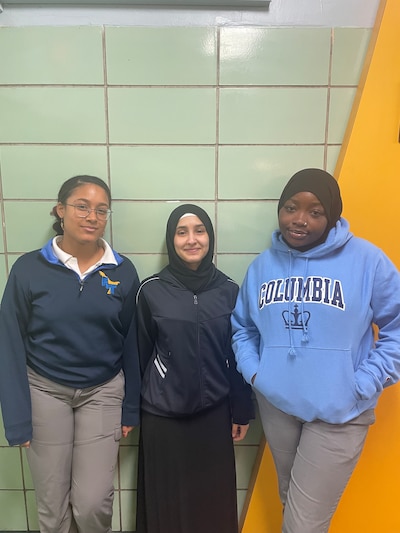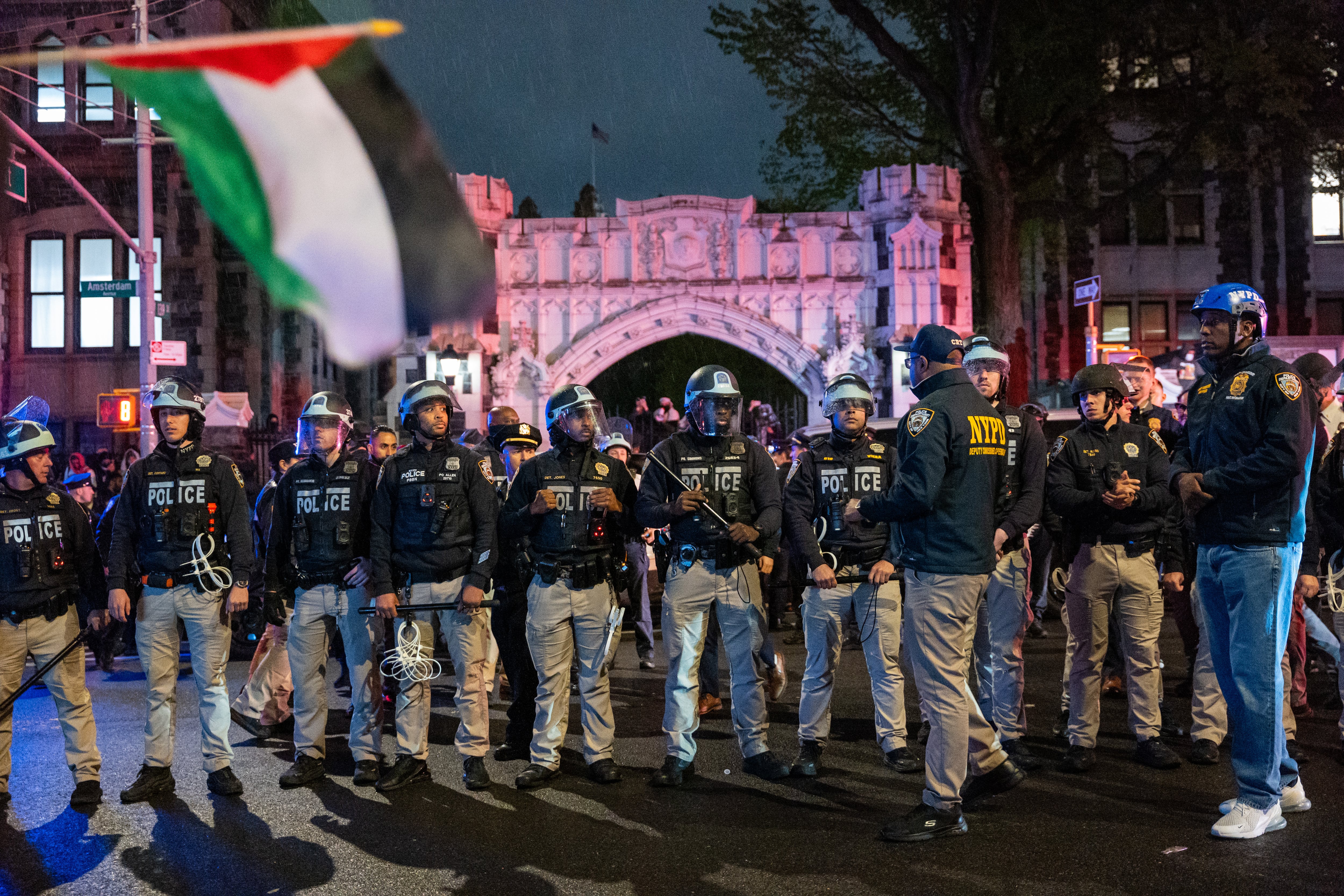Sign up for Chalkbeat New York’s free daily newsletter to keep up with NYC’s public schools.
As tensions reached a boiling point on college campuses in recent days over pro-Palestinian student protests and encampments, many New York City high schoolers were watching closely.
For juniors and seniors weighing their college plans, the events are offering critical information about the cultures of the campuses they may soon be joining — and in some cases swaying their decisions.
And some have been directly affected by the fallout from the protests and overwhelming police response at City College of New York and Columbia University.
The High School for Math, Science, and Engineering, known at HSMSE, is located on the Harlem campus of the City College of New York, steps away from a student-led tent encampment that NYPD officers raided late Tuesday night, sparking violent clashes with protesters and leading to nearly 200 arrests.
As the tumult arrived at their doorstep, the high school canceled in-person classes Wednesday, following the lead of City College.
“I think the way a college reacts to such a big issue like the protests right now can be kind of indicative of the way they react in the future,” said Gabriela Picazo, an 18-year-old senior at HSMSE, who plans to attend Brown University next year, one of the few colleges that reached a deal with protesters to end its tent encampment.
Students at HSMSE said the pivot to remote classes Wednesday posed some challenges, particularly for last-minute preparation for Advanced Placement exams that start this week. But they understood the decision was meant to keep them safe.
“It’s kind of dystopian seeing this area that’s supposed to be a safe space where we go eat and relax being flooded with cop cars and all the hostility there,” said one senior at the school, who spoke on the condition of anonymity to share his opinion on the situation freely.
Students were expected to return to in-person classes Thursday, but were told not to enter the campus quadrangle during the school day, according to a notice from the school’s principal obtained by Chalkbeat.
New York City’s public school system has seen its own controversial student protests, including a raucous demonstration at Hillcrest High School over a teacher posting a photo holding an “I Stand With Israel” sign, and a citywide walkout in support of a ceasefire in the Gaza Strip.
Protests and backlash prompt reflection on college plans
The protests on campuses across the country, as well as the response from administrators and law enforcement at colleges, have been top of mind for New York City high schoolers preparing to enroll in college. Many have been particularly gripped by the response at Columbia and City College, prompting some Jewish and Muslim students, as well as other applicants, to reconsider their options.

Hawa Fisiru, a senior at The Laboratory School of Finance and Technology in the Bronx, plans to attend Columbia this fall. The university’s history of student activism was a selling point: Fisiru participated in Black Lives Matter protests in 2020 and helped collect food for residents affected by a Bronx apartment building fire that killed 17 people in 2022.
Fisiru decided to enroll before pro-Palestinian student protestors launched an encampment, but said she’s “glad to be part of a student body that is, you know, really doing things.”
Despite the upheaval there, Fisiru is not having second thoughts about committing to Columbia. She received a full scholarship, and remaining in the city will allow her to stay close to family.
Still, Columbia’s response has left her concerned about what the mood on campus will be when she arrives this fall.
“I would have loved to, like, you know, have a calm freshman year, but I can’t help what’s going on, and I support what the students are doing,” she said. “I feel like they’re fighting for humanity and for what is right.”
But Safa Al-Omari, who is also a senior at The Laboratory School of Finance and Technology, is still deciding where to attend college. She has been leaning toward attending City College, though she’s also considering Hunter College.
Al-Omari, who was born in Yemen and came to the United States in 2016, said she wants to do more research about City College’s response to pro-Palestinian protesters before making a final decision.
“Being Middle Eastern, I have a lot of feelings about what’s going on,” Al-Omari said. “I would not want to go to a college that is arresting students based on them speaking for people who are suffering.”
Meanwhile, a Jewish family told CNN they opted against Barnard College, which is affiliated with Columbia, even though it had been their child’s first choice.
Bronx senior Kennedy Betances is also trying to decide between City College, which offered a generous financial aid package, and Fordham University, which she feels might be a better fit, since she hopes to become an environmental engineer.
She wants to learn more about the reaction to student protesters on each campus before making a decision.
“I can also see myself involved in activism on campus, and I wouldn’t want the institution that I committed to, that I’ve worked at, that I’m taking out student loans for, to just like, essentially turn their back on me, and leave me in the dust,” Betances said.
Picazo, the HSMSE senior planning to attend Brown University next year, was disheartened by news that dozens of student protesters were arrested last December at the university. But she was encouraged to learn that Brown struck a deal this week with student protesters to end a recent encampment without police involvement.
“It does kind of reassure me about the community that I’m going to join in the future,” she said.
Her classmate, 17-year-old senior Orlena Fella, said being so close to the City College protests has made her realize she wants to be around some of that same political activism when she’s in college.
“I started to realize that I do hold some value in just having that space for discourse and having students that do take a side or share out their perspective and feel comfortable doing so,” she said.
For some high school juniors getting ready to apply to college next year, watching sharp backlash to pro-Palestinian student protestors at some colleges could also raise uncomfortable questions about how they should approach their own college applications.
One Brooklyn high school junior, who spoke on the condition of anonymity so as not to jeopardize her college applications, said she’s involved with the Palestine Club at her high school, but is wary of including that on her resume because she fears it will hurt her application.
“Everyone I’ve spoken to said to not because colleges may ‘throw my application out the window,’” she said.
The tumult on college campuses comes as the city school system faces its own ongoing questions about its handling of student protests and antisemitism.
Schools Chancellor David Banks is slated to testify next week before the U.S. House of Representatives Committee on Education and the Workforce — the same Republican-led committee that recently grilled Columbia President Minouche Shafik on her response to campus protests.
In recent days, Banks has touted a number of efforts to address bias and educate students about the conflict, including an anti-hate crime curriculum, initiatives to teach Jewish and Muslim history, and a review of the discipline code with city principals.
Michael Elsen-Rooney is a reporter for Chalkbeat New York, covering NYC public schools. Contact Michael at melsen-rooney@chalkbeat.org.
Alex Zimmerman is a reporter for Chalkbeat New York, covering NYC public schools. Contact Alex at azimmerman@chalkbeat.org.






